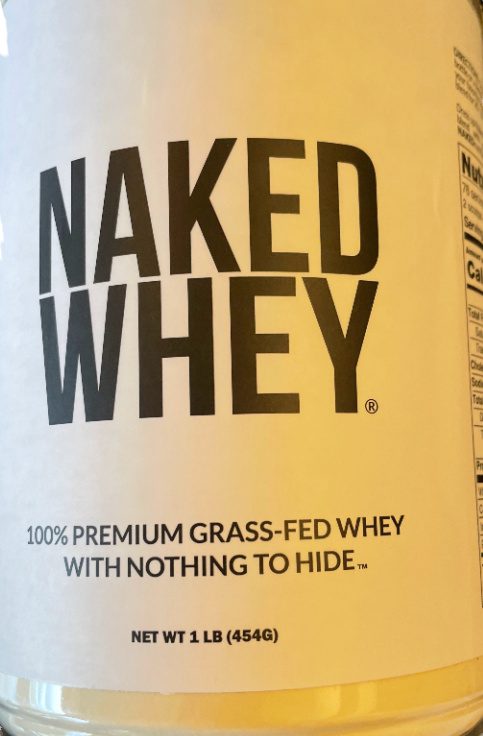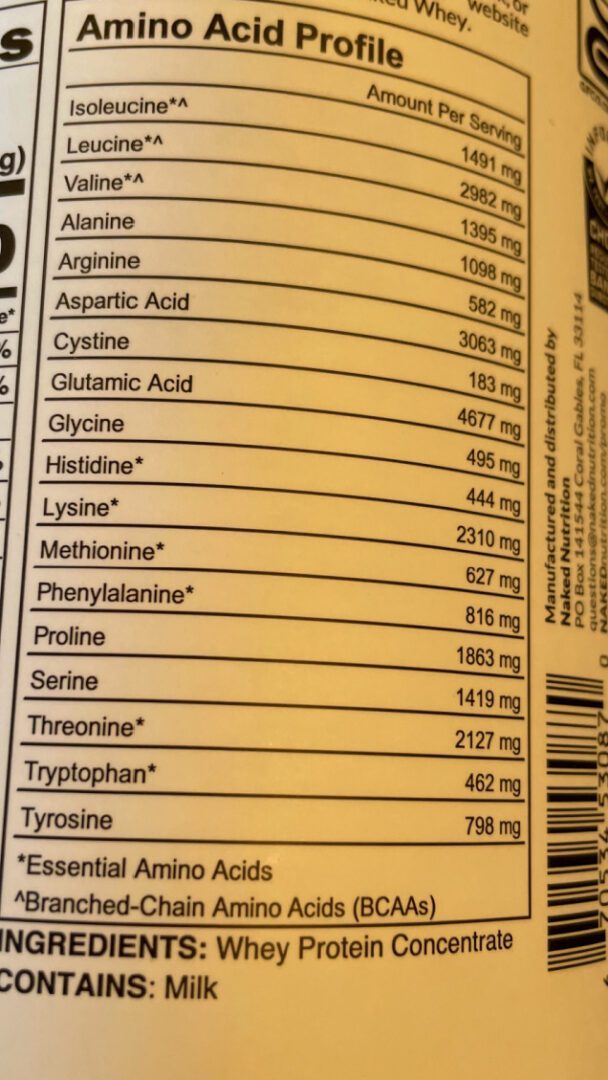Are you feeling a bit weaker this holiday season?
Are you feeling a little weak? Are those grocery bags a bit harder to carry? Even those holiday packages? Well, maybe you are getting weaker because you aren’t getting enough protein.
We talked about protein requirements recently in my Balance and Flexibility Class. You can find more about the class HERE
It’s difficult to get enough protein
We discussed how difficult it can be to get enough dietary protein in your diet. My solution, because I don’t particularly like meat is a protein supplement.
Podcaster Peter Attia recently interviewed Don Layman Ph.D. They discussed the importance of protein and most importantly the amino acids that are in the protein. Many amino acids are often lacking in protein supplements today. Again, another reason to become an avid label reader.
My husband and I (mostly my husband) researched a number of protein powders and came up with this protein powder that we felt would work for us. You can find it on amazon.

The podcast
#224 ‒ Dietary protein: amount needed, ideal timing, quality, and more | Don Layman, Ph.D.
“We want weight loss, but we don’t want people to lose any lean mass. Especially if they’re adults.” —Don Layman
Why is protein important
Protein is important to maintain our functional fitness and the ability to do our activities of daily living.
Mobility
Functional fitness/mobility is critical, particularly as we age. What does functional fitness/mobility mean? It means the ability to do what you normally do in a day. It can be shopping, walking, cleaning, playing with your grandchildren, golf, etc.
What does it mean when you lose your mobility
Consider that most people live to age 65. Unless you have cancer or some other illness, a person will generally die from some form of immobility.
This could mean a fall, which then can lead to hospitalization, more immobility and even death.
Learn more about falls and the impact a fall can have on your life
For more information on falls, check out this information from the national council on aging. https://ncoa.org/article/get-the-facts-on-falls-prevention
Metabolism
Your muscle is a primary site for insulin activity. Blood glucose and blood lipids are heavily dependent on muscle metabolism. Protein is necessary to maintain muscle mass.
The role of protein and essential amino acids
We can make 11 amino acids and other are 9 amino acids we have to get from our diet because we cannot produce them.
Amino acids are essential building blocks for new proteins, and each one has a specific metabolic role.
As you get older, the efficiency of protein turnover diminishes, in fact according to Dr. Layman a 65-year old may have 10% of the response of a 16-year-old to protein.
Calories or protein (what is more important)
If your calories go down, your protein intake should remain the same, but that is often not the case in an older adult. They may eat less, but much of that food may be carbohydrates. Next time you go out for lunch or dinner, look at what your friends are eating. Bread vs. protein?
What is a 75 year old woman’s protein requirement?
If a 75-year old woman’s calories go down to 1200 calories/day, she still needs 100 grams per day of protein. What this means is that 34-40% of her calories should come from protein. This is often hard for an older adult and the result of lack of protein is muscle wasting or sacopenia.
When people are looking at weight loss, it’s important to remember that the protein requirement is extremely important.
The most critical meal of the day is the first meal
Dr. Layman’s research shows that “the most critical meal of the day is the first meal of the day”. How often do you have protein with breakfast?
How to get the protein you need
Dr. Layman recommends front-loading protein in the day with at least two meals above 30 g of protein.
If you are trying to maintain minimal muscle, you should concentrate on the morning and evening meals for protein.
If you are trying to lose weight‒ concentrate on 3 meals containing protein because protein helps with satiation.
Meat impersonators
Dr. Layman discussed meat impersonators and specifically Beyond Burger. Here’s how Beyond Burgers are made.
The burger us primarily made from pea protein produced in Canada. It is then shipped to China, where it is processed and shipped back to the US (note that transportation cost is high in greenhouse gas). This is a fact I have debated with my cousin.
The burger returns to the US after its travels with around 25 ingredients, probably 5-6 of which may not be FDA-approved according to Dr. Layman.
The bottom line
1. Check your labels for protein supplements to be sure they contain the essential amino acids that are necessary. The ingredients from Whey Protein.

2. Add protein to your first meal of the day, a smoothie with fruits, veggies and protein can work well.
3. Ask yourself if you are getting enough protein during the day and could your muscle weakness be a combination of not enough protein and not enough muscle strength.
References
Podcast: The Drive
Much of this information is from the Peter Attia Podcast, called The Drive. The link to his podcast is below.
Please note that his podcasts are highly technical and long. So if you are feeling geeky, it’s a great listen.
https://peterattiamd.com/podcast/ Number #224 with Don Layman
NOTE: In the podcast, they discuss Dr. Layman’s funding sources and the reason for them.
